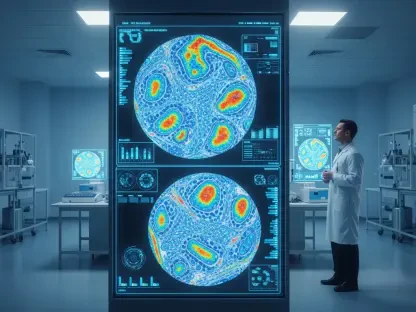The Worcestershire Acute Hospitals NHS Trust recently faced significant hurdles in capturing real-time observations of sepsis patients through its electronic patient record (EPR) system. Sepsis, a potentially deadly medical emergency, necessitates swift treatment to prevent organ failure and death. The introduction of Altera Digital Health’s Sunrise EPR across the trust’s three hospital sites brought visibility to ongoing challenges in sepsis patient observations, particularly affecting the accuracy of data recording.
Transition to Digital Health Record Systems
The deployment of the EPR system in the hospitals aimed at improving patient care through streamlined data management and better clinical decision support. However, following the system’s implementation, several difficulties arose in documenting sepsis screenings accurately. Clinical and digital leads collaborated extensively to address these challenges, identifying issues related to EPR documentation and a need for comprehensive staff training. Inconsistencies in how observations were recorded before digitization, coupled with varying baseline observations, further complicated the transition.
Despite these obstacles, Worcestershire Acute Hospitals maintained that sepsis patients continued to receive high-quality care. The need to address these data management issues became a priority, leading to the establishment of a task and finish group. This specialized group was set up to evaluate necessary changes to processes, equipment, and training to ensure that the EPR system could effectively support accurate and real-time sepsis patient observations.
To tackle the inconsistencies uncovered during the switch to digital records, the trust undertook a detailed analysis of pre-existing practices. Alterations in reporting methods highlighted inefficiencies and irregularities that had persisted unnoticed in the pre-digital era. By pinpointing these areas, the trust could align both clinical practices and the digital platform to improve overall data quality and ensure the reliable capture of critical health indicators for sepsis management.
Ensuring Comprehensive Data Management
Worcestershire Acute Hospitals’ proactive approach to these issues underscores their commitment to achieving excellence in patient care even amidst the challenges posed by the new EPR system. The collaboration between clinical and digital teams reflects a dynamic and responsive healthcare environment, ready to adapt and enhance processes for better outcomes. This initiative also underlines the importance of integrating advanced technology thoughtfully, ensuring that it complements and enhances existing healthcare practices.
One of the key priorities for the task and finish group was to address the equipment needs to support the new digital workflows. Ensuring that all necessary hardware and software were up to date and adequately aligned was critical for maximizing the EPR system’s potential. Additionally, comprehensive training programs for healthcare providers were developed to bridge any knowledge gaps, enabling staff to utilize the system effectively and efficiently. This focus on training aimed to minimize disruptions and ensure that staff could capture essential data consistently, improving both the reliability of the information and the quality of patient care provided.
Rachael Fox from Altera Digital Health emphasized that digital workflows brought to light pre-existing reporting inconsistencies, offering a chance for significant enhancements. The trust’s commitment to leveraging digital technology for improving healthcare outcomes sets a standard for others to follow. Increasing utilization of such systems not only assists in streamlining processes but also in providing actionable insights for care improvement.
Continuing Efforts in Sepsis Management
Sepsis remains a leading cause of morbidity and mortality, with significant impacts on healthcare systems worldwide. Statistics from the past several years show an alarming rise in sepsis-related deaths, highlighting the need for better management and prompt treatment. The efforts undertaken by Worcestershire Acute Hospitals reflect a robust and ongoing commitment to tackling this serious health issue head-on. The implementation of the EPR system, despite initial teething problems, forms a core part of this commitment, offering enhanced capabilities for monitoring and managing sepsis.
By continuously reviewing and refining their systems, Worcestershire Acute Hospitals aim to significantly reduce the negative outcomes associated with sepsis. The combination of advanced digital tools with a committed healthcare workforce is central to overcoming the challenges faced during the EPR adoption. The promulgation of standardized procedures and consistent training underscores the trust’s dedication to not only addressing current issues but also preventing similar problems in the future.
Moreover, the project’s collaborative nature fosters an environment of ongoing learning and adaptation. The trust’s proactive steps to involve various stakeholders in addressing challenges ensure comprehensive solutions that cater to diverse professional insights and practical needs. This holistic approach is indispensable for the successful integration of technology into healthcare, promoting sustained improvements and better patient outcomes.
Implementation Lessons and Future Directions
The Worcestershire Acute Hospitals NHS Trust recently encountered significant challenges in capturing real-time data on sepsis patients using its electronic patient record (EPR) system. Sepsis, a potentially fatal medical emergency, requires rapid and effective treatment to avoid organ failure and death. With the deployment of Altera Digital Health’s Sunrise EPR across the trust’s three hospitals, these issues became evident, especially in terms of accurately recording sepsis patient observations. The implementation aimed to enhance data visibility, but instead, it highlighted persistent issues with monitoring and documentation. Accurate and timely data entry is critical for managing sepsis, as delayed or incorrect information can severely impact patient outcomes. Therefore, addressing these EPR system issues is vital for improving the quality of care and ensuring that sepsis patients receive the urgent treatment they need to improve their chances of recovery.









